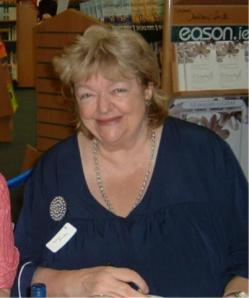Novelist Maeve Binchy, author of Circle of Friends, Light a Penny Candle, and many, many more, has died at the age of 72. And I’m heartbroken over it.
Binchy was never high-brow. But her novels—chiefly focused on the tangled lives of small Irish towns—were magical to me, primarily because I discovered them at a very particular time in my life. “Together with Stephen King … Binchy is the author who, for me, bridged the gap between childhood reading and adult,” Alison Flood wrote on the Guardian’s Book Blog today, and that is true for me as well.
I was 11 when I first read Circle of Friends, a melodramatic tale of two best friends in the ‘50s who leave their convent school for university and learn plenty of lessons about love and loyalty. The previews for the 1995 movie version, starring Chris O’Donnell and Minnie Driver, had caught my eye—that is, O’Donnell caught my eye—and I decided to pick up the source material. At the time, I was in desperate need of an escapist novel. Just weeks prior, my father had died unexpectedly at the age of 42, leaving my family—my mother, two brothers, and me—unmoored. We had no idea what the next steps would be: Would I change schools? Would we sell the house I loved so? How could my mother, who had an MBA from Wharton but had been a stay-at-home mom for more than a decade, support us? I, of course, couldn’t help much in these areas, so I retreated into books.
Circle of Friends turned out to be a perfect choice for me. It was accessible, even ideal, reading for a tween—especially one in mourning. The story begins when the two main characters, Benny and Eve, first connect at age 10—right about the age I was at the time. Binchy then fast-forwards eight years to when they are 18, which I envisioned as the most exciting, sophisticated time of life. Without any best friend at the time, I made these girls my companions and became deeply emotionally invested in their struggles. I particularly identified with Benny, an awkward, big girl with a huge chest who develops a hopeless crush on a gorgeous rugby star. I was an awkward, big tween with a rapidly growing chest, so I imagined that she prefigured what my life would be as a worldly 18-year-old.
When she won the campus stud’s heart, however temporarily, my own heart soared. (Binchy makes one resort to clichés, because she wielded them with no regret.) And then, halfway through the novel, Benny’s father dies unexpectedly. Binchy’s portrayal of Benny’s grief was so similar to my own, and so were the more practical challenges that lay before her: Would she continue with school? Would her mother sell the house? Could her mother, a homemaker, take over the family business?
Feeling validated by Binchy’s portrayal of grief, I devoured the novel in a week and then read it again immediately. I sought out her other books as well, and while I enjoyed them all, none of them reflected myself back at me the way Circle of Friends did. In middle school, I read it dozens of times, turning to it whenever confusion and sadness hit, which was quite frequently. Sometimes I would just open it to a random page and begin from there. For my 14th birthday, my best friend—I finally had one!—gave me a new copy of the book, because my old one had literally fallen apart, the first twenty pages lost somewhere and much of the text smudged. Seventeen years later, I still reread it on occasion. Each time, it makes that 11-year-old me resurface briefly, and I can take great comfort from the knowledge that life is not quite so scary anymore.
Binchy also gave me something else: an aversion to literary snobbery. As an English major in college, I was dangerously close to pretension, quick to dismiss any popular novel as trite and shallow. But Circle of Friends kept me from falling into that trap, and I am grateful for that perspective, as I’ve since enjoyed so many books that I know I am supposed to disdain.
Tonight I will make myself a cup of tea (or maybe pour a glass of sherry—Binchy’s characters seemed to constantly drink sherry) and curl up with Circle of Friends on my Kindle. And I’ll probably cry a little, which only seems fitting. Binchy crafted the most therapeutic tearjerkers I can imagine.
How I Came to Love Maeve Binchy

Photo by Jon Kay from Wikimedia Commons.
Advertisement